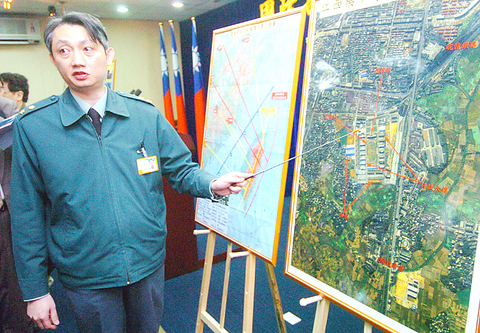The Ministry of National Defense (MND) said yesterday that China now has more than 800 missiles targeting Taiwan, and is increasing that arsenal at a faster pace of 75 to 100 per year.
The news came as Beijing defended its recent announcement of another double-digit increase -- 14.7 percent -- in this year's military budget.
"China was producing around 50 Dong Feng [DF] series ballistic missiles annually, but ... our intelligence has found it is now increasing by 75 to 100 ballistic missiles annually," said Lieutentant Colonel Chen Chang-hwa (

PHOTO: CHEN TSE-MING, TAIPEI TIMES
Chen said if cruise missiles are included, China now has more than 800 missiles aimed at Taiwan, enabling Beijing to potentially launch a five-wave missile attack continuing for 10 hours.
The PLA's ballistic missiles are now also more precise, according to Chen. They used to have a 600m margin of error, but that has been reduced to 50m, giving China the capability to more accurately hit Taiwan's power stations, radar bases, airstrips and military, economic and political nerve centers.
China's main ballistic missiles are DF-11 missiles that have a range of 600km, and DF-15 missiles that have a range of 800km, Chen added.
Chen said the PLA deploys its ballistic missiles in five bases in southeast China, at Leping and Kanzhou cities in Jiangxi Province, Meizhou City in Guangdong Province and Yongan and Xianyou cities in Fujian Province.
"The missiles can be transported by rail at any time to [China's] coastal areas," Chen added.
The MND also revealed details about the 1996 cross-strait missile crisis on the eve of the event's 10th anniversary.
On March 8, 1996, ahead of Taiwan's first presidential election, China fired ballistic missiles into the sea near Taiwan.
MND spokesman Rear Admiral Liu Chih-chien (
From July 21 to July 24, 1995, the PLA launched six DF-15 missiles from Jiangxi Province's Qianshan City, which traveled 481km before dropping into the sea 130km north of Taiwan, Liu said.
From March 8 to March 13, 1996, the PLA launched one DF-15 missile from Fujian Province's Nanping City, which traveled 500km and landed just 37km from Taiwan.
It also launched three DF-15 missiles from Yongan City that flew 460km before landing 55.5km from Kaohsiung City, Liu said.
"The two missile exercises proved that China's DF-series ballistic missiles, which have better accuracy, are able to effectively attack Taiwan's critical facilities and blockade the island," Liu said.
Liu said that while the 1995 missile drill was intended to bully Taiwan after former president Lee Teng-hui's (李登輝) visit to the US, the 1996 drill was an attempt to influence that year's presidential election.
The ministry had said that the missile exercises had a profound influence on the country's defense preparations.
The military started to develop anti-missile warfare capabilities after the drills, and began developing the nation's own strategic missiles to deter China.

ENDEAVOR MANTA: The ship is programmed to automatically return to its designated home port and would self-destruct if seized by another party The Endeavor Manta, Taiwan’s first military-specification uncrewed surface vehicle (USV) tailor-made to operate in the Taiwan Strait in a bid to bolster the nation’s asymmetric combat capabilities made its first appearance at Kaohsiung’s Singda Harbor yesterday. Taking inspiration from Ukraine’s navy, which is using USVs to force Russia’s Black Sea fleet to take shelter within its own ports, CSBC Taiwan (台灣國際造船) established a research and development unit on USVs last year, CSBC chairman Huang Cheng-hung (黃正弘) said. With the exception of the satellite guidance system and the outboard motors — which were purchased from foreign companies that were not affiliated with Chinese-funded

PERMIT REVOKED: The influencer at a news conference said the National Immigration Agency was infringing on human rights and persecuting Chinese spouses Chinese influencer “Yaya in Taiwan” (亞亞在台灣) yesterday evening voluntarily left Taiwan, despite saying yesterday morning that she had “no intention” of leaving after her residence permit was revoked over her comments on Taiwan being “unified” with China by military force. The Ministry of the Interior yesterday had said that it could forcibly deport the influencer at midnight, but was considering taking a more flexible approach and beginning procedures this morning. The influencer, whose given name is Liu Zhenya (劉振亞), departed on a 8:45pm flight from Taipei International Airport (Songshan airport) to Fuzhou, China. Liu held a news conference at the airport at 7pm,

AIR SUPPORT: The Ministry of National Defense thanked the US for the delivery, adding that it was an indicator of the White House’s commitment to the Taiwan Relations Act Deputy Minister of National Defense Po Horng-huei (柏鴻輝) and Representative to the US Alexander Yui on Friday attended a delivery ceremony for the first of Taiwan’s long-awaited 66 F-16C/D Block 70 jets at a Lockheed Martin Corp factory in Greenville, South Carolina. “We are so proud to be the global home of the F-16 and to support Taiwan’s air defense capabilities,” US Representative William Timmons wrote on X, alongside a photograph of Taiwanese and US officials at the event. The F-16C/D Block 70 jets Taiwan ordered have the same capabilities as aircraft that had been upgraded to F-16Vs. The batch of Lockheed Martin

GRIDLOCK: The National Fire Agency’s Special Search and Rescue team is on standby to travel to the countries to help out with the rescue effort A powerful earthquake rocked Myanmar and neighboring Thailand yesterday, killing at least three people in Bangkok and burying dozens when a high-rise building under construction collapsed. Footage shared on social media from Myanmar’s second-largest city showed widespread destruction, raising fears that many were trapped under the rubble or killed. The magnitude 7.7 earthquake, with an epicenter near Mandalay in Myanmar, struck at midday and was followed by a strong magnitude 6.4 aftershock. The extent of death, injury and destruction — especially in Myanmar, which is embroiled in a civil war and where information is tightly controlled at the best of times —